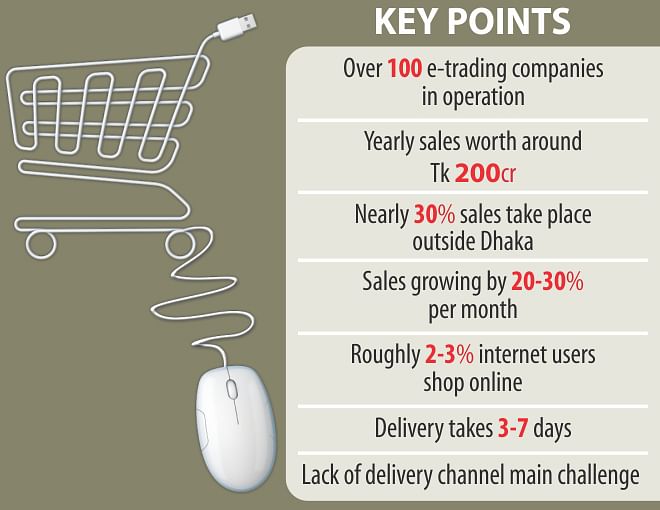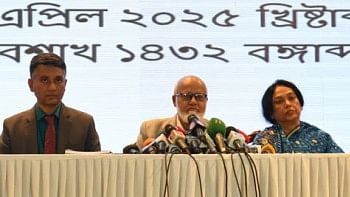It's time for e-trading

Ismat Ara has always found shopping for kitchen items irksome. She cannot stand the hassle and loathes bargaining. So for years, she has depended on her husband buying the essentials.
But last year she found a new means to buy such items without taking the trouble of going to a market. It's simple: She places the order online, gets the delivery at home within a week and pays the money.
“I usually buy fish and vegetables from online stores. So my husband, who works at a private company, doesn't have to worry about shopping anymore," said Ismat, a housewife from Segunbagicha in the capital.
This is e-commerce, which allows one to shop virtually everything online. In Bangladesh, online shopping has yearly transactions worth around Tk 200 crore at the moment and it is growing by 20-30 percent every month, according to industry insiders.
The idea of online shopping gained momentum in 2011 after the Bangladesh Bank cleared ways for payment by debit and credit cards in local currency.
Over the last two years, dozens of e-trading platforms launched operations. They offer a wide range of products, including kitchen items, apparels, gift items, furniture, electronic goods, home appliances and books.
Delivery time is three to seven days.
“Many people are buying goods or services through online portals, mainly to avoid hassles and traffic jams,” said AKM Fahim Mashroor, former president of Bangladesh Association of Software and Information Services (BASIS).
A BUSINESS WITH POTENTIAL
At present, the country has two types of online portals -- Business to Customer (B2C) and Customer to Customer (C2C). Under the B2C model, transactions take place between a company and consumers. Under the C2C model, one consumer buys products from another consumer.
The B2C category has received a good response as customers can get quality products at a reasonable price, said Mashroor, also founder of AjkerDeal.com, an e-shopping platform.
The operation cost of online stores is lower compared to the traditional stores or markets, as they don't need a big office or warehouses. Nor do they require a large workforce. This allows them to sell things at a cheaper rate, he added.
Online shopping is becoming popular in other parts of the country as well, with around 30 percent of the transactions taking place outside Dhaka.
Bangladesh's entry in e-shopping comes at a time when online portals account for a major share of daily retail trade in developed countries. Even in neighbouring India and China, more and more people are going for online shopping because it is convenient.
AjkerDeal.com, one of the leading online stores in the country, started operation in November 2011. It has served around 40,000 customers so far and has direct links with over 500 merchants.
Merchants are the original manufacturers or importers/distributors. On getting an order, the online portals collect the items from the merchants and then deliver those to the consumers. The portals get a commission from the merchants for every item sold.
IT'S INTERNET
One thing has made all this possible: the internet. Rise in internet users means rise in online shoppers. And the internet's availability on mobile phones has added a further dimension to its growth. Although not all, some online stores receive orders from mobile phones.
According to Mashroor, around one crore people in the country now use the internet regularly. Of them, 20-25 lakh have accounts on Facebook, which is another platform for online shopping. Currently, 2-3 percent of the total internet users do shopping online in the Business to Customer category.
Rokomari.com, which sells books online, has also received an extraordinary response. Since its launch in January 2012, it has sold about 2.5 lakh copies of books.
“Customers are interested in shopping books online because they get a vast collection in one place. Also, the price is reasonable and the delivery charge is minimal," said Mahmudul Hasan Sohag, chief executive of Rokomari.com.
It charges just Tk 30 for delivery of any number of books anywhere in the country. So far, it has uploaded around 80,000 book titles, mostly Bangla literature and text books for university students.
Rokomari serves outside the country as well, including in the US and India. Many people from West Bengal are now buying famous Bangladeshi writers' books, said Sohag.
Initially, customers preferred to pay upon delivery. But an increasing number of people are shifting to online payment, as their confidence in the service has grown.
Beside books, Rokomari.com sells CDs and VCDs of songs, movies and dramas.
Many people, particularly in the capital, are buying kitchen items like fish and vegetables from online shops, said Sadequa Hassan Sejuti, managing director of Future Solution for Business (FSB).
The company operates an online portal -- amardesheshop.com -- to sell vegetables, fish and handicrafts to urban people.
"The prices of vegetables and other products that we offer are usually lower than the market prices," she said, adding that the firm receives orders online and over the phone and delivers goods to consumers on a weekly basis.
FSB, a youth enterprise that introduced e-commerce in the country in 2009, has clinched the United Nations World Summit Youth Award 2011 for "creating outstanding digital content for rural people". It has direct links with around 5,500 rural people, including farmers, weavers and fishermen, who can post their produce on the portal for sale.
The company is serving its customers through 10 e-centres in Mongla, Narsingdi, Tangail, Sirajganj, Jamalpur, Rangpur, Sylhet, Gopalganj, Mymensingh and Gazipur. It has more than 8,000 registered customers, according to Sejuti.
THE ROAD AHEAD
But despite all its benefits and business potential, not all online platforms are making large profits.
In all, about 100 e-trading companies are now in operation, and some 40 of them sell products worth about Tk 55 crore a year under the B2C category. Of these 40 portals, 10 are doing well.
"It's because they [those doing well] are well prepared," said Mashroor.
But there are other factors slowing the growth, main among those being the lack of a suitable delivery channel.
The growth of e-commerce largely depends on good delivery partners. But the country has so far failed to create an environment for such third-party service providers to flourish. Most courier services refrain from shipping perishable items across the country, said Sejuti, who came to the limelight by selling sacrificial animals online for the first time in the country two years ago.
“The absence of a proper delivery channel is the main challenge for the sector. The government postal service should come forward to overcome this," she added.

 For all latest news, follow The Daily Star's Google News channel.
For all latest news, follow The Daily Star's Google News channel. 



Comments